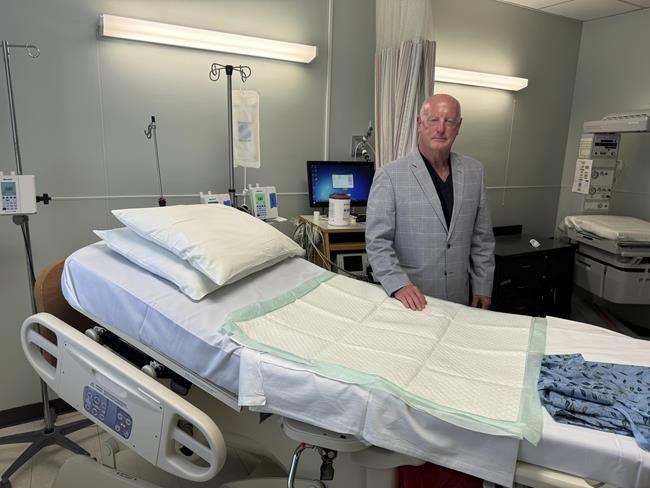
FILE - Dr. Max Rogers, the obstetrician-gynecologist at Grove Hill Memorial Hospital, poses for a photo, July 15, 2024, in Grove Hill, Ala. (AP Photo/Safiyah Riddle, File)
February 14, 2025 - 8:34 AM
MONTOGMERY, Ala. (AP) — A bill that would expedite Medicaid coverage and prenatal health care for low-income pregnant women in Alabama has advanced as lawmakers across the South try to address rising maternal and infant mortality rates.
The “presumptive eligibility” legislation states that Medicaid will pay for a pregnant woman’s outpatient medical care for up to 60 days while her application for the government-funded insurance program is being considered.
“This way we cut out some of the red tape, we get them in as quickly as possible,” said Rep. Marilyn Lands, the Democrat representing Huntsville who introduced the bill.
Processing Medicaid applications can take weeks, Lands said, and physicians say early prenatal care is vital.
Last year, nearly 1 in 5 pregnant Alabama women received prenatal care after five months of pregnancy, or otherwise received less than 50% of the appropriate number of the recommended visits throughout her pregnancy, according to The March of Dimes.
The bill passed in the Alabama House of Representatives unanimously. It will now be considered by the Senate. Republicans celebrated the bill as a “pro-life” measure.
Alabama’s delivery health outcomes currently lag far behind the rest of the country.
One study found Alabama had a maternal mortality rate of 64.63 deaths per 100,000 births between 2018 and 2021, nearly double the national rate of 34.09 per 100,000 births. That jumps to 100.07 deaths for Black women in the state.
Other states have adopted a similar strategy for addressing some of the highest infant and maternal mortality rates across the country. Legislators in both Mississippi and Arkansas have introduced bills that would offer similar coverage to expectant mothers. Mississippi passed a law last year that was nearly identical to the Alabama legislation, but it was never implemented after negotiations with the federal Medicaid agency stalled, according to Mississippi Today.
Alabama and Mississippi are among 10 states nationwide that have not expanded Medicaid, which means many low-income women are only eligible for Medicaid once they become pregnant.
In Alabama, 1 in 6 women of childbearing age fall within the coverage gap, making too much to qualify for Medicaid but too little to afford private insurance, according to Alabama Arise, an advocacy group for low-income families.
A pregnant woman in Alabama with no dependents can qualify for Medicaid if she makes $21,996 or less, or up to $37,704 if she is part of a household of three.
Medicaid was used to pay for 45% of all births in Alabama in 2023, according to the most recent report published by the Alabama Department of Public Health. More than half of all infant deaths were to mothers who used Medicaid.
Dr. Max Rogers, an obstetrician-gynecologist who works with many low-income pregnant women in rural communities, said medical care during the first trimester is essential for ensuring a woman is in a safe environment for carrying a pregnancy and identifying potentially lethal threats early on.
“The longer you have to get blood pressure under control, or get diabetes under control, the long-term outcomes are going to be much, much better,” Rogers said.
Rogers’ rural office was the fourth labor and delivery unit to close statewide in 2024. He was able to relocate an hour and a half south where he has continued seeing some of his patients — but the closures have left huge swaths of women in the state without access to prenatal care.
Rogers says he supports the bill but that it will only be effective if other measures are taken to increase access to care.
“If we don't make sure that a patient can get there and take advantage of services, it doesn't really have an impact, right?” he said.
News from © The Associated Press, 2025